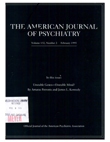Cardiovascular complications of ECT in depressed patients with cardiac disease
Abstract
OBJECTIVE: This study was conducted to determine the safety of electroconvulsive therapy (ECT) for depressed patients with serious cardiac disease. METHOD: The rate of complications in 40 patients with major depressive disorder and left ventricular impairment, ventricular arrhythmias, and/or conduction delay who received ECT was compared to the rate of complications in a matched comparison group of 40 depressed patients without cardiac disease who also received ECT. In addition, 21 of the patients with cardiac illness had received one or more inpatient trials of tricyclic antidepressants before receiving ECT, thereby permitting a comparison of cardiovascular complications of medication and ECT in the same patients. RESULTS: The patients with cardiac disease had a significantly higher rate of cardiac complications during ECT than did the comparison group without cardiac disease. The type of preexisting cardiac abnormality strongly predicted the type of cardiac complication that occurred during ECT. However, most of the complications were transitory and did not prevent the completion of ECT. Of the 21 patients with cardiac disease who had received tricyclic trials before ECT, 11 had been forced to discontinue drug treatment because of substantial cardiovascular side effects. In comparison, 38 of the 40 cardiac patients completed the course of ECT. CONCLUSIONS: With close monitoring for the development of arrhythmia and ischemic episodes, ECT can be given with relative safety to patients with severe cardiovascular disease.
Access content
To read the fulltext, please use one of the options below to sign in or purchase access.- Personal login
- Institutional Login
- Sign in via OpenAthens
- Register for access
-
Please login/register if you wish to pair your device and check access availability.
Not a subscriber?
PsychiatryOnline subscription options offer access to the DSM-5 library, books, journals, CME, and patient resources. This all-in-one virtual library provides psychiatrists and mental health professionals with key resources for diagnosis, treatment, research, and professional development.
Need more help? PsychiatryOnline Customer Service may be reached by emailing [email protected] or by calling 800-368-5777 (in the U.S.) or 703-907-7322 (outside the U.S.).



